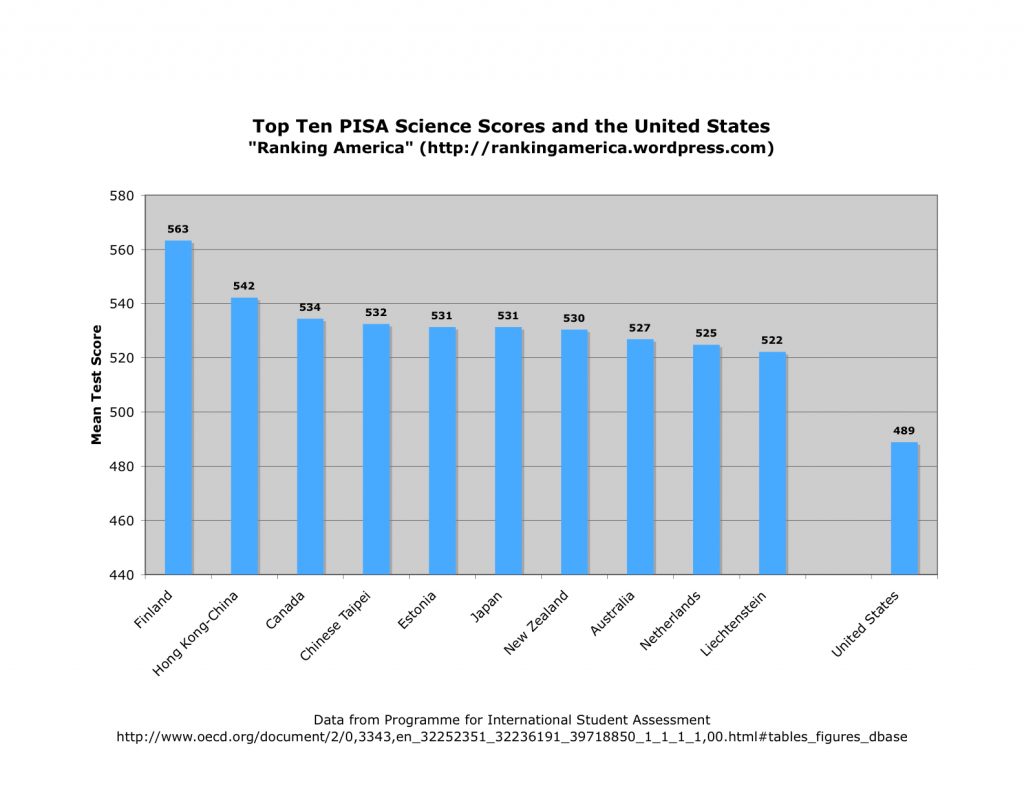09 Apr Failing education or failing middle class?
 Compared to the countries we increasingly compete with in this globalized world, American educational test scores stink. Everybody knows it and everybody is getting busy looking for culprits and solutions. Which can only result in one thing: nobody can agree to what the cause is. We don’t challenge our kids enough! We challenge them too much! Teachers aren’t held accountable enough! Teachers spend too much time with accountability standards, so student time suffers. We get frightfully wooed by ruthless Asian tiger mothers and we begrudgingly confess our kids are turning into lazy slobs because we don’t drill enough violin practice at an early age. And then we let out sighs of relief as soon as Finland becomes the country in vogue. Laid-back Finland, with their school kids loafing around their classrooms in slippers after entering school at the advance age of 7, all while making top PISA scores. And without even undergoing the rigor of standardized testings!
Compared to the countries we increasingly compete with in this globalized world, American educational test scores stink. Everybody knows it and everybody is getting busy looking for culprits and solutions. Which can only result in one thing: nobody can agree to what the cause is. We don’t challenge our kids enough! We challenge them too much! Teachers aren’t held accountable enough! Teachers spend too much time with accountability standards, so student time suffers. We get frightfully wooed by ruthless Asian tiger mothers and we begrudgingly confess our kids are turning into lazy slobs because we don’t drill enough violin practice at an early age. And then we let out sighs of relief as soon as Finland becomes the country in vogue. Laid-back Finland, with their school kids loafing around their classrooms in slippers after entering school at the advance age of 7, all while making top PISA scores. And without even undergoing the rigor of standardized testings!
But despite all the fledging attempts at measuring, comparing and altering public schools, private schools and charter schools, the U.S. can’t seem to get past mediocre scores or find any silver bullets.
Last month author and social critic Naomi Wolf made the case that our educational system has become entangled with our consumerist culture, which in turn influences the character of the student base and their attitude towards learning. Somewhere on Manhattan wealthy parents are willing to dish out $40 000 a year to ensure their children enjoy luxurious enrichment activities and endless positive stimulation, including contact with teacher any time of day. Clearly these parents are hip to our failing educational system and avoid it as if it were a contagious disease. These pricey private schools provide every form of security measure and intellectual stimulation a 21st century helicopter parent could wish for. But years later, when their little chicks are coming home to roost, it turns out all that bubble wrap failed to prepare them for the real world with all its thorns and rough spots. Wolf’s basic argument is that the education-turned-commodity system which allows the almighty dollar to smooth out almost any obstacle is starting to produce some unintended side effects. Children who are never given the opportunity to lose or to prove their strength in the face of real problems turn out “nice, but notably passive and indecisive” and totally unprepared for the harsh realities of global competition.
Underpinning Wolf ‘s article is not a particular interest for the well being of spoiled rich kids of course, but the pervasive angst surrounding an impending educational dystopia that will turn our workforce into under-skilled puppets for foreign based corporations rather than word class leaders of Apple sized dimensions. But I can’t help being a bit puzzled why Wolf chooses to gripe with a few snobby schools that enroll only an infinitesimal number of American students.
The fact that elite kids can glide through life effortlessly and with no true sense of obstacles is certainly not fair to the rest of us and enough to trigger the gag reflex in families who work two or three jobs and send their kids to underfunded public schools. I am just wondering if these rich kids are as instrumental in causing such a dismal future that she seems to suggest. I do understand that by never learning a lesson of humility, these kids can potentially cause massive damage to the world economy given their predestined positions. These kids will staff power institutions where they will enjoy tremendous financial and political leverage, and where a super inflated ego may wreak havoc far beyond whichever organization they happen to staff. The recent stock market bubble is rife with examples. But precisely because there goes a straight line from elite schools through ivy tower campuses to key political positions and Wall Street, would it be so bad if these institutions recruited some “nice, but notably passive and indecisive” individuals for a change? People who are too dull to innovate convoluted financial schemes or too inept at legislating tax loopholes for their cronies? But oh well, who knows how they will turn out in their insulated worlds anyway.
Is it really true that students need to be “roughed up” in order to prepare for the hardship of global competition? A bad teacher might teach you something about life itself, but is it worth losing a year of learning and a lifetime of interest for that experience? Wolf’s line of reasoning makes some sense, but her examples are merely anecdotal and the stats show a very different picture. I understand the point about learning resilience and character, and there’s even been done studies to prove that too! But all the numbers show that failing educational performance is almost always an effect of hardships and rarely a result of affluence.
And here is where I agree with Wolf the most: that a shrinking middle class has left the country with an educational two-tier system, where in which a few schools with empowered parents, access to private money and strong PTAs move in the opposite direction of underfunded schools with lackadaisical parental involvement in less affluent areas.
The U.S. has the highest levels of child poverty in the developed world. And in the current economic dip, the rate is growing. Recent estimates predict that 26% of all children in the U.S. will fall under the poverty threshold in 2014. I don’t know of too many other developed countries where 1 in 5 children worry where their next meal will come from. And if they do, how well do these kids perform in school?
When American schools are adjusted for poverty, U.S. kids have some of the highest educational scores in the world. American schools with less than 10% poverty score higher than any other country in the world.
But I have a hunch that it might be a good idea for educators in developed countries to take a close look at the subjects their students tend to elect for their future careers. There is probably a case to be made that whenever a large section of the student population gravitate towards liberal arts degrees rather than more employable professional degrees or hard sciences they aren’t “hungry enough”.
There is a theory – nah, lets call it a tacit assumption, in social sciences and especially generational theories that goes something like this: Once a family or a country reaches materialistic satiety, ambitions and social mobility in the following generations start leveling off and social decline ensues. In his famous short story from 1895 The Time Machine H.G. Wells imagines a future without goals and hard work, and where humans start to degenerate and ”takes to art and eroticism. Then comes languor and decay”. I think there is a very real and justified fear in economically developed countries that we have reached this phase and are being outperformed by more disciplined harder workers in developing countries. This is why I find the Finnish example so fascinating. This small post-materialistic country share very little with “hungry and aggressive” Korea, China and India, but seems to be able to produce the same results with carrots instead of sticks. And when asked what are the secrets to their success, the answers are: good teachers, parental involvement and, yes, low poverty rates.


Sorry, the comment form is closed at this time.